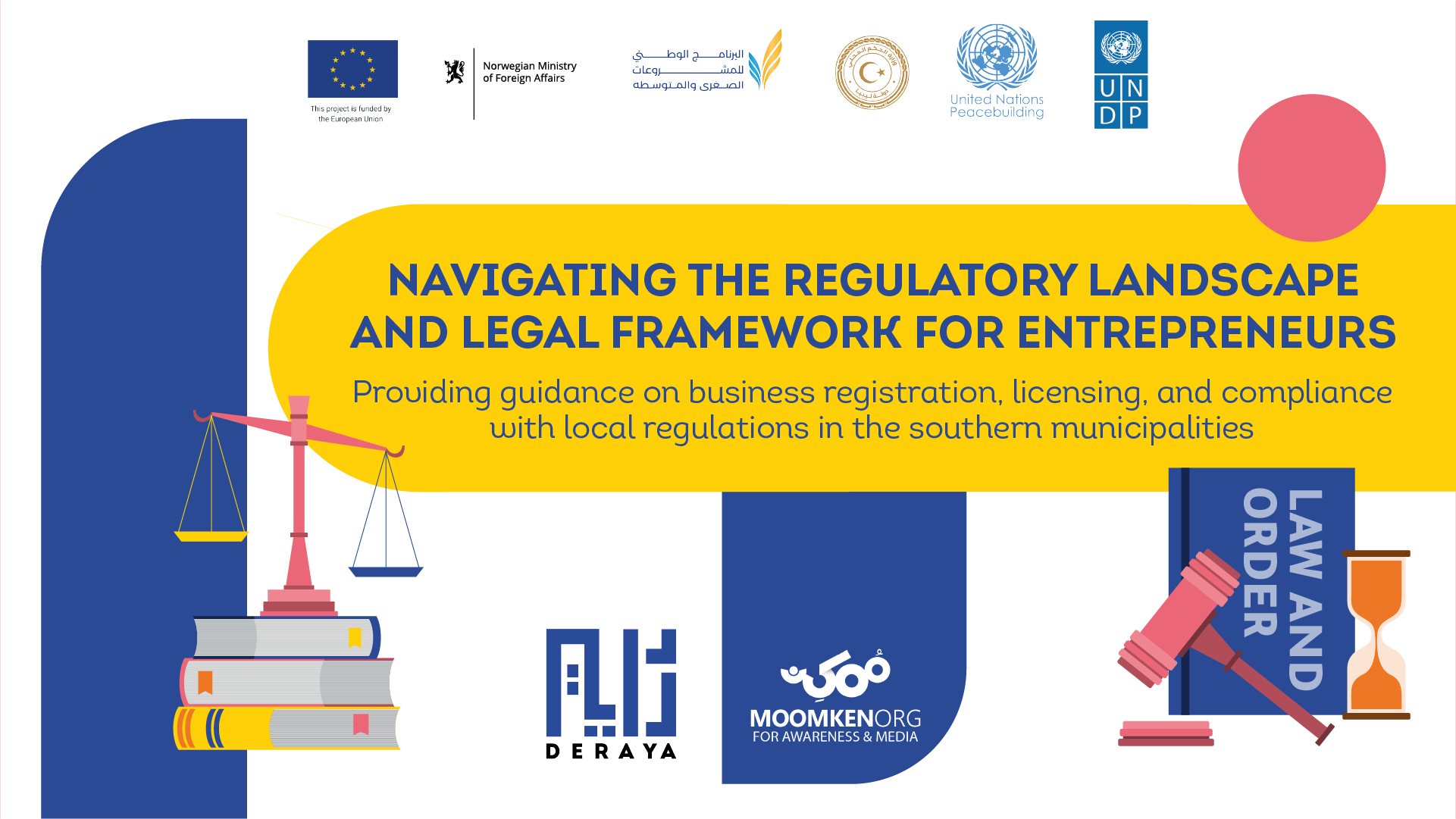At the beginning, we must understand that entrepreneurship in Libya is of great strategic importance in supporting sustainable economic development and promoting economic diversification. Small and medium-sized enterprises are a backbone of the local economy , contributing to job creation, increasing income and improving citizens' standard of living. However, these companies face many challenges such as bureaucracy, weak infrastructure, lack of funding and the effects of political and security turmoil that further complicate the process of establishing and operating businesses.
It is essential that there be a legal and regulatory framework based on the principles of transparency and justice that supports and protects entrepreneurs and investors and provides them with the legal protection necessary to develop their ideas and projects with confidence. In addition, this framework should include legislation that encourages innovation and investment in research and development and provides incentives and financial support for new initiatives and emerging projects.
Opportunities are reflected in the diversification of Libya's economy and the willingness of the market to absorb new innovations and solutions, representing a productive environment for entrepreneurship and growth. It is therefore important that we strengthen this legal and regulatory framework and provide the necessary support to start-ups and entrepreneurs to achieve a sustainable and prosperous economic future in Libya.
We hosted both Mr. Mohammed Al Asoud, Chairman of the National Entrepreneurship and Innovation Policy Preparation Committee, and Ashraf bin Nasr, Representative of the Micro and Medium Enterprise Support Unit of the Central Bank of Libya.
The Concept of Legal and Regulatory Framework for Entrepreneurship in Libya
The legal and regulatory framework for entrepreneurship is the backbone of the economic environment that helps to prosper start-ups and innovators in any economy. This framework consists of a variety of laws and regulations that determine the rules and procedures to be followed for the establishment, operation, and growth of companies in a legal and sustainable manner.
These laws include corporate laws that determine the types of companies allowed, the procedures for their establishment, and the rights and duties of company members. It also includes tax legislation that specifies taxes required from companies and tax incentives that may be available to encourage investment. In addition, there is practical legislation regulating working conditions and employees' rights, and environmental legislation establishing a framework for business activities to reduce environmental impact.
Besides laws, the regulatory framework also includes administrative structures and government institutions responsible for implementing laws and providing support and assistance to start-ups. These include economic development agencies and regulatory bodies that provide consultations, training and funding to support new business growth.
The legal and regulatory framework for entrepreneurship is essential for building a dynamic and encouraging business environment for innovation and economic growth. The development and improvement of this framework in line with current challenges and opportunities greatly contributes to enhancing investments, stimulating companies' expansion and development, thereby contributing to job creation and increasing economic stability in different countries.
Mr. Mohammed Alasoud stated “in Libya, the concept of entrepreneurship is seen as small businesses, but entrepreneurship is an ideology, not just establishing a company. Therefore, when we deal with the concept and the reality of entrepreneurship, it is important to see its reality as an ideology for the Libyan society, in economics, education and other areas. The person who is able to turn the idea into something concrete benefits from it and creates a value called entrepreneurship, so entrepreneurship can be: university, bank, hospital, state or society even”.
He also added, "Entrepreneurship is the creation of community value and material value. Material value has to do with growth, and increasing growth creates greater jobs and higher incomes in the South. "
The impact of laws and regulations on entrepreneurship:
The effective impact of laws and regulations on entrepreneurship is essential to each country's economic and societal environment. These laws play a crucial role in determining the success of innovative start-ups. The right legal and regulatory framework ensures an enabling environment for investment and sustainable economic growth.
On one side, laws provide the legal protection and security necessary for investors and founders, increasing their confidence in the local market. This includes intellectual property rights, guarantees around purchases and sales processes, and clear procedures for establishing and managing companies efficiently.
On the other hand, the regulations regulate business behaviors and reduce dishonest practices, ensuring fair competition and fostering ethical culture in the market. In addition, regulations may offer financial and tax incentives to start-ups, enhancing their growth and expansion opportunities.
However, the challenges faced by startups as a result of the additional costs of complying with laws and regulations, which may affect the ability to innovate and invest in new projects, must also be noted.
In short, laws and regulations must be constantly developed to provide a legal and regulatory environment that promotes entrepreneurship, stimulates innovation, and contributes to the sustainable and equally distributed growth of the local economy.
Ashraf bin Nasr stated, "The innovation aspect is very important whether it is for entrepreneurs, enterprise, society, government and all aspects. What exists in the south is not significantly different from what exists in the rest of the areas whether it is on the side of awareness and culture or on the side of the procedures followed in establishing enterprises and starting these projects. "
Legal and regulatory status in the municipalities of the southern Libya:
In the municipalities of southern Libya, the legal and regulatory situation presents a variety of challenges and opportunities that are at the heart of the region's local development and political stability. These municipalities face unique challenges, including security and stability, lack of infrastructure and delayed economic development. Nevertheless, the region provides rich potential for natural and cultural resources that can be invested to promote sustainable development and strengthen the local economy.
The legal and regulatory situation requires clear and effective procedures to strengthen the rule of law and economic development. This includes improving infrastructure to support economic activities, strengthening local governance to improve resource management and provide basic services to citizens. In addition, central government must adopt incentive policies that support entrepreneurship and provide incentives for investments in local sectors such as agriculture, tourism and renewable energy.
By improving infrastructure, promoting education and vocational training, and providing financial support to small and medium enterprises, southern municipalities can play a vital role in promoting the national economy and achieving sustainable development in Libya as a whole.
Ashraf bin Nasr stated, "Entrepreneurship is about the idea, enterprise, a new and innovative view of providing a service or product to society through which growth and sustainability are achieved." He also added: "There is a difference between entrepreneurship and micro- and medium-sized projects that aim to meet specific needs in the market and provide stable income for its owners”
Challenges faced by entrepreneurs due to legal and regulatory frameworks:
Challenges faced by entrepreneurs due to the legal and regulatory framework are major obstacles to their growth and positive impact on the economy and society. One of the most significant challenges is the legal and procedural complexities surrounding the establishment and operation of companies, where these procedures are time consuming and require significant financial resources, which hampers pioneers in implementing their ideas quickly and efficiently. In addition, challenges include monopolies and bureaucratic fees that may be expensive for small and emerging businesses, reducing their competitiveness and growth in the domestic and global market.
Moreover, tax legislation poses an additional challenge, as it may be complex and impose an additional burden on emerging businesses, negatively affecting small and medium enterprises' financial planning and sustainability. The challenge includes not only financial aspects, but also lack of financial support and funding from banks and financial institutions, especially for start-ups that may lack a long financial history or sufficient guarantees to obtain funding for their growth and expansion.
To overcome these challenges, it is essential that Governments and local authorities take decisive steps towards streamlining administrative and legal procedures and providing an enabling regulatory environment that supports innovation and entrepreneurship. Appropriate financial and tax support should also be provided to maintain small and emerging firms' competitiveness and contribute to the promotion of investments and job creation. In addition, efforts should focus on improving awareness and education of new laws and regulations among entrepreneurs, to ensure their full and true commitment and avoid potential legal risks.
Mohammed Alasoud stated “the idea of transforming entrepreneurship in Libya into a reality is not simple. As experts in expertise France association, we have worked in this context, including entrepreneurship and innovation in higher education and technical education. On the other hand, it is very important for the government sector to have an entrepreneurship association where the administration can work on solving the problems that face citizens. So that the government sector needs to be developed in a manner that includes this issue.”
He also added, “ the government sector is not qualified to deal with these texts, such as the problem of transportation and high expense of fuel in the South. As a result, the South does not engage in any practical activity and can not compete with coastal cities at all. The government and the state therefore have the greatest task of creating markets. The state must intervene in regulating and creating a market”
Improving and addressing the legal and regulatory framework to support entrepreneurship:
Improving the legal and regulatory framework to support entrepreneurship is essential for strengthening local economies and promoting innovation and job creation. Entrepreneurs in many countries face significant challenges as a result of the legal and bureaucratic complexities that hinder the establishment and operation of startups. Streamlining and improving this framework contributes to creating a more transparent and competitive environment and increases investors' and entrepreneurs’ confidence.
First, laws and regulations must be understandable and accessible to all, making it easier for entrepreneurs to adhere to and deal with them without unnecessary obstacles. Legislation should be flexible to ensure adaptation to rapid economic and technological developments.
Secondly, through the creation of appropriate tax and financial incentives, investment in small and emerging enterprises can be encouraged and supported in achieving sustained growth and creativity.
Third, strengthening infrastructure and logistics, such as communications and transportation, can contribute to improving the efficiency of operations and reducing costs, thereby stimulating economic growth and creating more jobs.
Fourth, the focus on continuing education and training of startups' pioneers and employees enhances their ability to run business efficiently and enhances the potential for success and continuity in the market.
Fifth, Governments must have effective anti-corruption mechanisms and promote good governance, contributing to a fair business environment conducive to growth and sustainable development.
By adopting these actions and improving the legal and regulatory framework, entrepreneurship can be supported, promoting innovation and investment in local economies, thereby achieving sustainable economic development, employment creation and prosperity in local communities.
Mohammed Alasoud mentioned “In the South, it is very important to involve the local people in the development , to become and entrepreneurial society. The most important thing Deraya initiative can do as one of its activities is to try to spread awareness to as many people as possible and show them how they can participate whether it’s for the local community, government departments, education, health, agriculture, the economy and all other areas.”
In conclusion, Libya's entrepreneurship legal and regulatory framework emerges as a vital element that plays a significant role in promoting the local economy and encouraging innovation and investment. Despite the challenges that startups may face, efforts to streamline administrative procedures and improve laws and regulations will significantly contribute to enhancing the business climate and attracting more investment.
Achieving sustainable development requires enhancing transparency and promoting good governance, as well as enhancing infrastructure and continuous training of the workforce. Through the comprehensive and integrated implementation of these reforms, Libya can benefit from its considerable economic potential and achieve sustainable growth that benefits all segments of society.
Therefore, continuing work to improve the legal and regulatory framework for entrepreneurship in Libya is a necessary step towards economic and social stability, national development goals and sustainable prosperity.
Other Case Studies
The Moomken Organisation hosted Hind Al-Bashari,...





